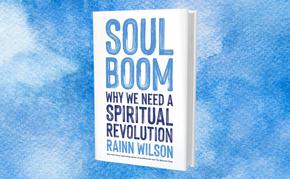The views expressed in our content reflect individual perspectives and do not represent the authoritative views of the Baha'i Faith.
‘The grass withers, And its flower falls away, But the word of the Lord endures forever.’ Now this is the word which by the gospel was preached to you. Therefore, laying aside all malice, all deceit, hypocrisy, envy, and all evil speaking, as newborn babes, desire the pure milk of the word, that you may grow thereby, if indeed you have tasted that the Lord is gracious. – I Peter 1:24b-25; 12:1-3.
On an atheist web forum someone asked me what it would take for me to disbelieve in God.
I thought about it, and replied that I really didn’t know. There wasn’t any one thing, or if there was, I hadn’t encountered it yet. She applauded my “sleight of tongue,” using the term to mean she thought I was trying to be evasive.
I wasn’t being evasive. Nor would I use her phrase—“sleight of tongue”—to refer to simple evasiveness. To me, sleight of tongue means that the writer or speaker offers a hypothesis, then begins to “move the goal posts,” speaking as if the hypothetical situation is now established fact.
Here’s how it works: The writer or speaker posits a theory about what “might have happened,” then subtly changes the language from the theoretical (“might have,” “could have”) to the positive until they speak of the hypothetical incident or situation as if it had actually happened. Suddenly the reader is no longer hearing someone’s opinion, they are hearing facts. The writer proceeds as if the point has been proven rather than merely raised.
Want a good example? Hyam Maccoby’s The Mythmaker: Paul and the Invention of Christianity. Maccoby tells us that according to Ebionite sources (which he does not cite), The Apostle Paul (aka Saul of Tarsus) was never, as he claimed, a Pharisaical rabbi, but rather a Gentile, born of “god-fearing” parents. Further, he calls Paul “an adventurer of undistinguished background.” We are asked to accept the author’s word that the adjective “undistinguished” is accurate—ditto, the descriptive noun “adventurer,” both of which are emotionally loaded, evocative words.
Maccoby proceeds with the rest of his commentary on Paul as if he has stated facts. Then, later in the same chapter, he says that “Even though Saul, after his conversion to Judaism, never actually became a Pharisee rabbi, the mere fact that he felt a strong urge in later life to represent himself as having been one must be significant. It means that … this had been his dream. If his parents were indeed ‘God-fearers’ (i.e. Gentiles who lived as Jews), they must have told him about the famous Pharisees of Judea… The young Saul would have heard the names of the greatest Pharisee leaders … he may have seen [them].” (emphasis mine)
Maccoby concludes by asserting that “The young Saul, planning to be a full convert, would be impelled by his naturally ambitious nature to see himself as no ordinary convert, but … a great Pharisee leader himself.” At the end of the chapter, Maccoby sums up what we can supposedly “surmise” about Paul based on the foregoing: “We may surmise that he made an abortive attempt to rise in the Pharisee movement; that he enrolled with some Pharisee teacher for a while … but proved a failure.” The finale: “Instead of his dream of respected status as a rabbi, the reality was ignominy as a member of the High Priest’s band of armed thugs.” – Mythmaker, pp. 98, 99.
Can you see it? These paragraphs are a case study in the manipulation of perception. After laying out a fabric of mixed hypotheses and statements of fact (must be, may have, must have, would have)—all of which are opinions about what Paul might have thought, been and done—the author claims that, based on these suppositions, we may surmise Paul’s actions and attitudes. The author becomes omniscient!
As a rhetorical device, this assumption of omniscience can be very useful—in fiction. It allows a writer to paint a picture of someone or something that—unless the reader is aware enough to see through the specious claims—can outlast and outweigh any factual information that she might glean.
I’m uncomfortable with this usage, even from writers whose viewpoints I share. Maybe it’s because I’m primarily a writer of fiction—but even in the realm of non-fiction, I’m a firm believer that showing, not telling, is the best way to communicate honestly.
The Baha’i teachings recommend, when you investigate religion, to look for reality, not supposition, surmise or unsupported rhetoric. When you read or hear about the lives of the founders of the world’s great Faiths, don’t trust mere opinion—instead, examine the actual facts:
What, then, is the mission of the divine Prophets? Their mission is the education and advancement of the world of humanity. They are the real Teachers and Educators, the universal Instructors of mankind. If we wish to discover whether any one of these great Souls or Messengers was in reality a Prophet of God, we must investigate the facts surrounding His life and history, and the first point of our investigation will be the education He bestowed upon mankind. If He has been an Educator, if He has really trained a nation or people, causing it to rise from the lowest depths of ignorance to the highest station of knowledge, then we are sure that He was a Prophet. This is a plain and clear method of procedure, proof that is irrefutable. – Abdu’l-Baha, The Promulgation of Universal Peace, p. 364.
Next: The Elusive, Illusive “They”–You know, THEM!
You May Also Like
Comments

















Zeal of St. Paul is always notable:
2Ti 4:2 Preach the Word; be prepared in season and out of season; correct, rebuke and encourage—with great patience and careful instruction.
2Ti 4:3 For the time will come when men will not put up with sound doctrine. Instead, to suit their own desires, they will gather around them a great number of teachers to say what their itching ears want to hear.
2Ti 4:4 They will turn their ears away from the truth and turn aside to myths.
think. That doesn't allow us an "unfettered" search for truth. There
has been at least one Christian apologist who says we must see
Jesus in one of only three possible
ways: as "liar, lunatic, or Lord", with
no nuances. I think the atheist lady
was also trying to limit your choices;
I suspect she was assuming if something terrible happened to you,
you would conclude God doesn't
exist, when we know the ...misfortune
wouldn't prove any such thing. My
late father taught me the folly of such manipulation with a classic
example, the question "Have you
stopped beating your wife yet?". Is
there any good answer to that?